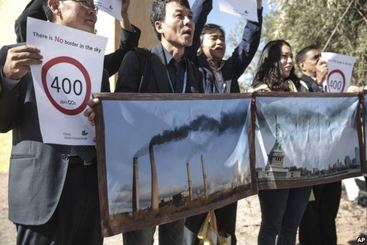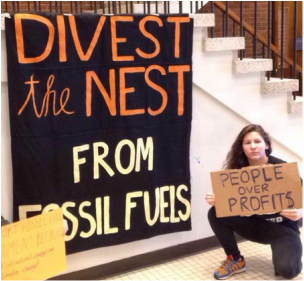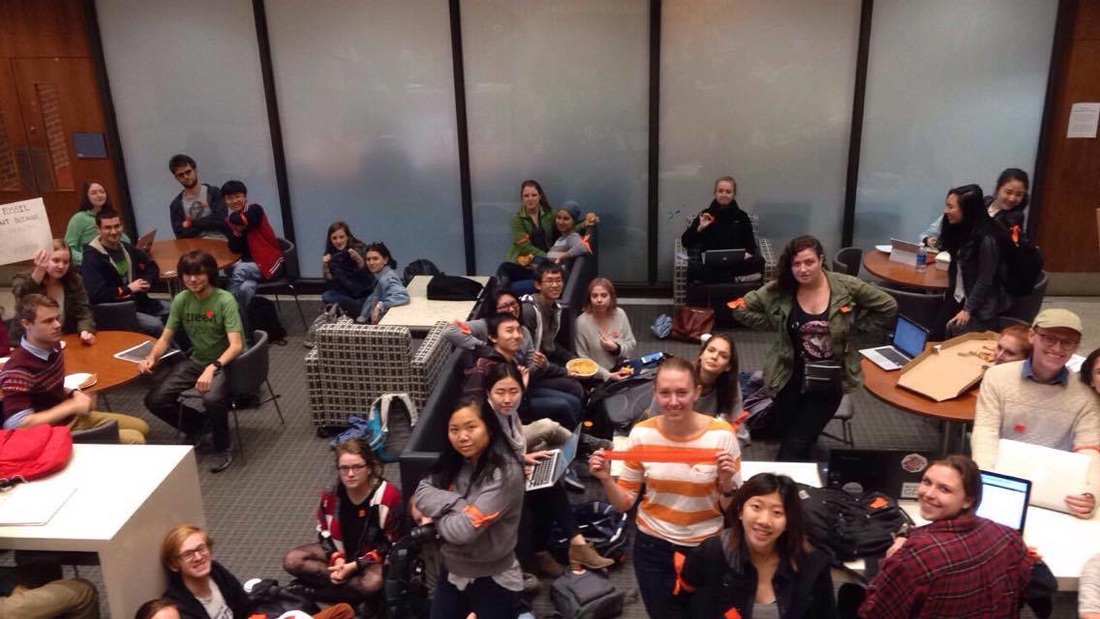|
Fossil Fuels: At the COP
I want to take a moment and address the concerns about fossil fuel companies attending the UNFCCC. There has been a petition created by Corporate Accountability International and signed by many attendees--especially youth activists--to ban fossil fuel businesses from the COP. Dr. Jonathan Pershing, Special Envoy for Climate Change and head of the U.S. negotiation team, addressed this concern in his press conference for youth delegates yesterday afternoon. When asked if he would support closing the door fossil fuel attendance at the COP, his response was a firm no. He candidly spoke to the importance of having these ‘dirty’ businesses in the room so he could keep tabs on their interest and learn how to change their mind. Edging them out of conversations in which they could become great allies in clean energy, an imminent transition by the looks of recent market trends, creates bad blood and might block future partnering for innovation. “If I paint them into a corner, I think I’m gonna lose,” Pershing said. To clear things up--these energy companies? They’re here as observers. Much of the COP is closed-door meetings between party delegates. Anyone here from an energy company has just as much access to closed meetings as I do: and trust me, they’ve been pretty strict about “Party Only” rules. Yes, representatives can network and talk to party members, but delegates are extremely busy and barely have time for lunch: as evidenced by the lovely UK woman who sat next to me at the restaurant yesterday--poor thing practically inhaled her stirfry, exchanged a few nice words (I had to pester her, of course) and promptly left 8 minutes later. As observers, the fossil fuel representatives actually stand to learn an immense array of things about climate change--its impact on indigenous people, the public health effects, the damage to the markets, and the great potential for improvements, innovation and economic growth. I challenge anyone to listen to the words of an indigenous woman from Chilé speak to the decimation of her homeland and not be at least a little moved. Fossil Fuels: At Home Moving toward green investments is a market-driven reality. Though I support the inclusion of energy companies at the conference, I do not stand behind the inclusion of fossil fuel companies in invest portfolios. Especially those owned by universities full of academic, socially and environmentally aware people who should know better. That leaves me wondering why, in the face of blatant evidence that fossil fuels are archaic and destined to decline, some institutions continue fiscally supporting them. Many universities and businesses, like Microsoft and Harvard, have opted to reallocate parts of their endowments or investment portfolios from fossil fuels, often reinvesting in renewables. I’m disappointed to say that my home institution, Johns Hopkins University, has failed to follow these examples of environmental responsibility. I love my school: it has its flaws, as any university does, but overall I can say that Hopkins is a huge part of who I am today. Hopkins informs and challenges my worldview through its diverse student body, nurtures and grows my mind through fantastic courses led by passionate professors, and feeds my soul through the extracurriculars I have been able to pursue. Without Hopkins, the road to Marrakech would have been much more of a struggle for me. I am able to attend the COP because of a grant Dean Martinez gave me (shoutout to the Parents’ Fund, and also to my own mother--the other big reason I was able to go!). For all the forward thinking and progressive ideals the administration loves to embrace, I hope divestment would be one of them. Come on, Hopkins. Our endowment is meant to spur the education of future world leaders, not to bolster the bottom line of carbon-emitting fuel companies. I view the school's money as something that should be used to holistically address student and world well-being: fossil fuels do not align with this. We are leaders in public health, engineering, innovation: we should be leaders in fiscal responsiblity. It’s time to put our money where our mouth is. Finally, a big shoutout to Refuel Our Future, the JHU student group working towards divestment at Hopkins. The photos featured in this post are from the recent sit-in they staged in our administrative building on campus. Student activism remains a strong force of change: the university represents us and is meant to act in our interest. Proud of my fellow Blue Jays for taking a stand to protect the planet. Thanks to Christian Cayon for the photos!
13 Comments
Krysten Dema
20/11/2016 10:01:17 am
I find it interesting that fossil fuel companies were possibly going to be ban from COP. I can understand the reasoning for the idea; however, I do think allowing the fossil fuel companies, to attend COP would be beneficial for the same reason that Pershing stated. Allowing fossil fuel companies to attend COP, would potentially lead to a group collaboration and possible solutions.
Reply
Emily Miller
20/11/2016 04:30:15 pm
It surpises me that they tried to ban fossil fuel companies since they play such a sufficient role. These companies should hear all the negative impacts fossil fuels have in the environment and be willing to change to help the environment. Also, fossil fuel companies could have the biggest impact because they control the fossil fuel production and without them, there is no problem.
Reply
Daniel Kikel
29/11/2016 06:29:06 am
That's all true, but at the same time we still rely on fossil fuels so we can't quite get rid of them. Sure they can ban them, but that probably won't do very much.
Reply
Noah Kready
21/11/2016 12:10:53 pm
As I read the section on the possibly ban of fossil fuel companies from attending COP, I tried to see the argument from both sides. On one hand these companies are the reason this meeting is needed, as their actions have been irresponsible in the past. Even knowing this we can't just shut the door on these people, we must take this time to invite them in and let them learn the right way to do things. Everyone is at COP to learn how to make our world a cleaner, and overall better place for us to live in. Also knowing that Microsoft and Harvard are leading the way in supporting renewable energy is a comforting thought. This post also made me wonder what my school, York College of Pennsylvania, is doing to help?
Reply
Harrison Perring
21/11/2016 02:26:55 pm
The impact fossil fuel companies have on the ecosystem and world as a whole regarding fossil fuel production is a very interesting yet pertinent topic that must be recognized globally. After reading this entry, I was somewhat surprised that the fossil fuel companies were originally going to be banned from the COP. This idea seems counterintuitive to the purpose of these conferences. While I understand that these companies are viewed as the producers and arguably the origin of this nation-wide problem, I believe that they can also be the driving force behind achieving a solution that we so desperately need. With the cooperation of these commercial fossil fuel companies, we can educate them and change their influences for the better of the world. Together, we can make our planet a better place to live.
Reply
Jonathan Marin
21/11/2016 06:23:59 pm
I understand and respect Dr. Pershings decision to keep an open door toward fossil fuel attendance at the COP. This was a very wise decision, but one has to wonder if such attendees will even consider other sources of energy. Especially, when their source is not depleted. Hopefully their attendance influenced them to change for the better.
Reply
Daniel Kikel
29/11/2016 06:36:40 am
I do believe that the fossil fuel companies will have a hard time switching their uses because there is so much money in their companies now. They may not be very willing to give up that money, but hopefully they can make a difference and start using a product that promotes clean energy.
Reply
Alex Hoffmaster
22/11/2016 01:01:25 pm
When I first read about allowing these companies to the attend the first thing that entered my mind was the famous quote, keep your friends close and your enemies closer. I am not saying that these two parties are enemies by any stretch but instead see differently in certian topics than one another. I believe it is important to have as many people as possible attend this event, no matter who they are, because it can only grow its popularity and reach more people.
Reply
Sierra Pari
26/11/2016 11:56:20 am
I find it beyond shocking that they were going to ban fossil fuel company's. They should be able to see why the world needs and change and everyone would be able to have somewhat of input on these topics
Reply
Samantha Choi
27/11/2016 09:25:56 pm
Do you have plans to push for your university to become more environmentally responsible? If so how would you plan on going about this? What methods would you suggest to implement?
Reply
Brittny Aguiar
29/11/2016 06:40:38 am
I am glad to hear about how fossil fuels are falling out of favor and jobs in environmental fields are expanding more than coal jobs. Hopefully more schools and companies will get involved. There is really little reason for anyone to still be focusing on fossil fuels.
Reply
Madeleine King
29/11/2016 02:53:25 pm
very cool to see refuel our future get a shout out! Always good to see divestment getting the attention it deserves. But i wanted to say that i felt a little like the first and second parts of the article seemed a little contradictory to me. The point of divestment movements from my understanding is to trigger a cultural shift in how we see fossil fuel industries. By forcing a university to declare that the profits from and association with fossil fuel industries is incompatable with the values of the institutions, we hope that this moral delegitimization will resonate throughout our society, damaging the reputations politicians who associate with fossil fuel industries as uncredible, in order to reduce the power and influence these industries have over our political and economic system.
Reply
Madeleine King
29/11/2016 02:54:20 pm
What makes you think they would they care that the unintended consequences of their practices are decimating the communities of indigenous people when they engage with practices that actively and intentionally destroy indgegenous communities? Across the globe, fossil fuel industries have seized the lands of indigenous people, made them uninhabitable through environmental degradation, and funded the violent suppression of those who resist or ask these companies to pay for damages. Take just one example, the struggle of the Ogoni people in the Niger Delta. Shell began oil production on Ogoni land in 1958. Since then, oil production has displaced 80,000 people. A 2011 assessment of over 200 locations of Ogoniland by the UNEP found that because of oil spills, oil flaring and waste discharge much of the soil is no longer viable for agriculture and groundwater was found to be contaminated with benzene, a carcinogen, at 900 levels above WHO guidelines. Oil production in this region destroyed the local economy and dangerously impacted health through air and water quality. As the Ogoni people mobilized to oppose the exploitation and destruction of their communities, Shell requested, backed, and financed terror campaigns against the Ognoi people. In 2009, Shell agreed to a settlement payout to the Ogoni people after human rights attorneys brought a series of a cases to hold shell accountable for human rights violations in nigeria including summary execution, crimes against humanity, torture, inhuman treatment and arbitrary arrest and detention.
Reply
Leave a Reply. |
Categories
All
Archives
March 2024
|



 RSS Feed
RSS Feed
